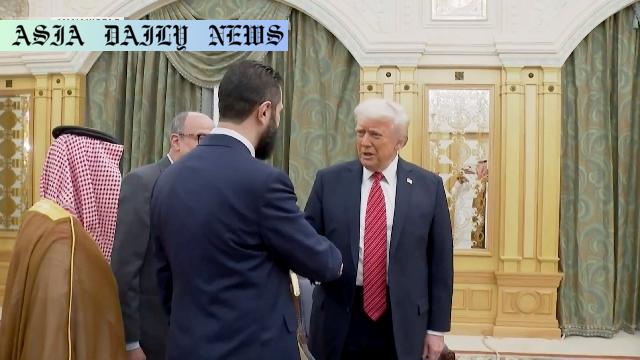Sanctions Relief: The US Treasury announces eased sanctions for Syria to boost reconstruction and foster economic recovery.
- Sanctions relief announced by the US Treasury eases restrictions on Syria.
- The transitional government in Syria aims at economic reconstruction.
- US Secretary of State termed it a step towards better US-Syria relations.

Introduction: A New Chapter for US-Syria Relations
The recent decision by the US Treasury Department to ease sanctions on Syria marks a significant development in the relationship between the United States and the Middle Eastern nation. This move aligns with instructions from US President Donald Trump, emphasizing support for Syria’s transitional government and economic reconstruction efforts. The authoritarian rule of the Assad family, which lasted for over half a century, came to an end in December last year. With the fall of Bashar al-Assad’s regime, the interim government is now tasked with rebuilding the country from the ground up. This policy shift not only paves the way for investment but also signifies a positive step in fostering diplomacy and regional stability.
The Easing of Sanctions and Its Implications
The US Treasury Department has issued a general license that permits previously restricted activities, such as new investments in Syria and transactions with its transitional government. This bold step is part of a broader strategy by the Trump administration to create a bridge of cooperation and mutual support. By removing financial barriers, the US is aiding Syria’s economic recovery and contributing to rebuilding critical infrastructure devastated by years of conflict. A focus on development and reconstruction not only benefits Syria but also opens avenues for American and global investors to engage positively in the region.
Syria’s Transitional Government: A Nation in Reconstruction
Syria’s transitional government, led by interim President Ahmed al-Sharaa, faces monumental challenges as it seeks to stabilize the nation. After decades of authoritarian rule, the interim government aims to foster democratic values, rebuild infrastructure, and restore economic vitality. Meeting US President Donald Trump in Riyadh earlier this year was a pivotal moment, highlighting international support for governance transition. The lifting of sanctions allows Syria to focus on its priorities: rebuilding homes, schools, and hospitals, restoring utilities, and creating economic opportunities for its citizens. This support underscores the importance of global collaboration in times of rebuilding and reconciliation.
Strategic Steps Towards a Rebuilt Syria
With the easing of sanctions, the Syrian government must prioritize transparent and sustainable development. Efforts to engage international partners will be critical in reshaping the nation’s future. Investment in education and healthcare will not only uplift the standard of living but also ensure long-term stability. Moreover, fostering small businesses and entrepreneurship can rejuvenate local economies, creating a ripple effect of growth and prosperity. Proper governance, coupled with international aid, will be the cornerstone of Syria’s successful transition.
A Collaborative Vision for the Future
The decision to relax sanctions on Syria signals a shift in geopolitical dynamics. It reflects the United States’ willingness to support nations in transition and to encourage democratically driven governance. By promoting development and inclusivity, this move sets an example for constructive engagement between nations. As Syria embarks on this arduous journey of rebuilding, it becomes increasingly important for the global community to provide unwavering support, ensuring peace and prosperity in the region. This collaborative effort could serve as a model for other nations recovering from conflict.



Commentary
An Optimistic Beginning for Syrian Reconstruction
The US decision to lift sanctions against Syria is more than an economic shift; it represents hope for a nation ravaged by years of war. This policy change underlines the importance of collaboration in fostering stability and recovery. By easing restrictions, the United States demonstrates its commitment to supporting human rights, economic growth, and global harmony. President Trump’s emphasis on empowering Syria’s transitional government reflects an understanding that sustainable development must be built on trust and partnership.
Challenges and Opportunities Ahead
Though the sanctions relief is a promising start, the path to complete recovery for Syria remains fraught with challenges. The nation’s infrastructure has been greatly weakened, requiring significant investment in rebuilding. Furthermore, rebuilding trust among its citizens, who have lived under authoritarian rule for decades, will be critical. Policy-makers must leverage this moment to ensure transparency and effective use of resources. Simultaneously, international investors have a golden opportunity to engage responsibly and constructively in Syria’s growth story.
The Role of the Global Community
This move also signals the need for a unified global effort to address the broader challenges in the Middle East. By promoting economic recovery and fostering diplomatic relations, the United States sets an example for other nations. Collaborative efforts will not only help Syria but also enhance regional stability, reducing the risk of further conflict or extremism. It is essential that global stakeholders continue to support Syria’s transitional government while encouraging accountability and fairness.
A Future Built on Cooperation
The lifting of sanctions on Syria marks the beginning of a new journey for the nation. It is a testament to what can be achieved when nations prioritize reconciliation and mutual cooperation over conflict. Moving forward, it will be crucial to maintain this momentum, ensuring that Syria emerges as a stable, prosperous nation. The responsibility to support Syria does not lie solely on its government or neighboring countries; it is a shared global task to bring peace and prosperity to those who have endured so much.